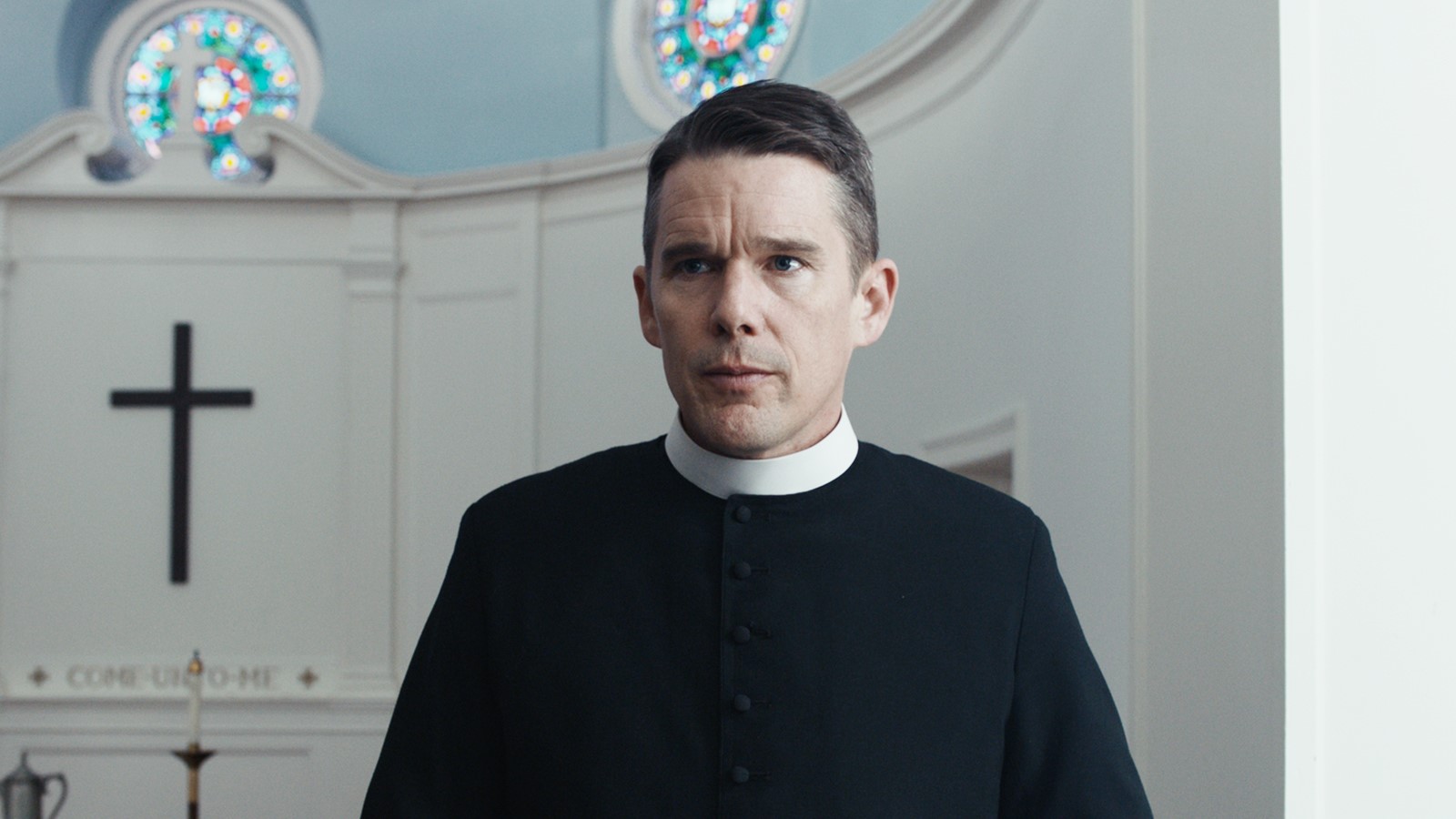
Sometimes overshadowed in his collaborations with Martin Scorcese, writer-director Paul Schrader was a singular voice of the New Hollywood generation who managed to define a style all his own and maintain an auteurist commitment to and repetition of themes spiritual, intellectual, and macabre within the context of the commercial film to present day.
Raised in a fundamentalist Calvinist community in Grand Rapids, Michigan, film was forbidden throughout his childhood, and he relays his first film going experience at 17 as being a hallucinatory episode wrought with guilt and fear. But it didn’t take long before this forbidden pleasure asserted itself in his life and leaving behind plans to become a minister he began studying film and writing criticism, eventually attending UCLA where many of the New Hollywood generation were getting their starts, and writing Transcendental Style in Film, a study of the films of Bresson, Ozu, and Dreyer that posited a shared film structure Schrader would use as a model for many of his most iconic screenplays.
Drawing early inspiration from the Asian and European arthouses which resonated with the spiritual foundation of his strong Calvinist upbringing, Schrader would go on to transplant this intellectual tradition to the American exploitation film form, most famously in the Scorcese-directed Taxi Driver (1976), a film enacting the Dostoyevskian dilemma of self-justified murder within the form of the vigilante thriller, having its heyday on the success of Charles Bronson’s reactionary Death Wish (1974) and blaxploitation films like Foxy Brown (1974).
By the mid-1970’s Schrader would already have success as a screenwriter, selling his script for Rolling Thunder in 1973, a vigilante film following a troubled Vietnam vet and ex-pow that would come off like a first draft of Taxi Driver and would be produced in 1977 by director John Flynn, as well as Yakuza, a neo-noir thriller and study of the Japanese underworld co-written by his brother Leonard who had spent time teaching in Japan, and sold to and directed by Sydney Pollack, prefiguring Paul and Leonard’s later return to the Japanese warrior ideal with Mishima in 1985, and finally making the leap to direction with Blue Collar in 1978.
Despite the breadth of work Schrader would cover in over thirty feature films, central to Schrader’s output remains a cycle referred to as the “man in a room” movies, including Taxi Driver, American Gigolo, Light Sleeper, The Walker, and proximally First Reformed which follow one another like repetitions on a theme of alienation and existential crisis in the tradition of the French and Russian existential novel and the Transcendental Style (and especially Robert Bresson’s 1959 Pickpocket) he defined as a narrative bound to a narcotizing hyper-naturalism and everydayness that in its final act – on a note of decisive action or divine intervention – erupts into a transcendental moment – a fleeting sense of insight or liberation – made in its contrast to the quietude which came before, a movement, in the lurid world of Paul Schrader, most often associated with the outburst of violence.
1. Taxi Driver (1976) Written by Paul Schrader

“Loneliness has followed me my whole life, everywhere. In bars, in cars, sidewalks, stores, everywhere. There’s no escape. I’m God’s lonely man.”
As a relatively early work of Schrader’s Taxi Driver is remarkably close to the filmmaker at the height of his powers, and the collaboration between Schrader, director Scorcese, and lead actor Robert DeNiro was one of those rare perfect unities of distinct creative forces coming together on a project, Schrader providing Scorcese with one of the most personal and challenging scripts he would ever direct, and Scrocese elevating Schrader’s material with a kinetic cinematic sense Schrader could never replicate on his own – not to mention composer Bernard Hermann’s final score, a military-jazz anthem of loneliness as iconic as any of his work today.
The angriest of the “man in a room” movies, Taxi Driver follows DeNiro’s Travis Bickle, a young Vietnam war vet who begins working as a cabbie in New York City when an insomniac stretch has him driving around nights anyway. We follow Travis along his apprenticeship in the job and familiarization with the night world of New York, while getting to know him through a voiceover narration of frustrated, inarticulate introspection taken from the pages of a diary we see him write throughout the film (just one of the many aspects of the film directly drawn from Bresson’s Pickpocket) which reveals a man plagued by loneliness, alienation, and violent psychotic urges, without any interest in culture or politics, the hedonistic use of drink or drugs, and without ambitions save to “become a person like other people”.
The film suggests a number of interpretations of Travis’ alienation: PTSD as a result of his experiences in the war, mental illness as evidenced by the pill bottles scattered around his apartment, sexual pathology in his seemingly spiteful frequenting of porno theatres, in a reactionary disgust at the perceived immoralities of the New York City life he sees on the shift, or in the existential void of being defined by his job alone. “You get a job. You become the job” Peter Boyle’s veteran cabbie tells him. “You do a thing and that’s what you are.”
But perhaps it plants the seed for Travis’ plans that follow. After a rejection by Travis’ idealized love interest Betsy (Cybill Shepherd), who cuts off contact after Travis tries to bring her to a porno theatre for a movie date, – out of sheer bad sense, or some self-defeating impulse it isn’t clear – Travis turns his anger against the popular presidential candidate Chalres Palantine (Leonard Harris) in whose campaign office Betsy worked, and begins to plan an assassination, conceivably a roundabout revenge on Betsy, but also as a resentment-filled attack on the entire straight society Betsy and her fellow campaigners represent, the one inaccessible to Travis.
Murder for Travis becomes a desperate means of throwing himself into the outside world, and in the collapse of life and death into the unity of a single action, the fulfillment of a heroic death wish, furnishing his empty life with a definite – if absurd – meaning.
But Travis’ assassination does not come off before finding a separate outlet in his paternal relationship with a young prostitute Iris (Jodie Foster) who tries to get into his cab one night only to be wrestled back by her pimp Sport (Harvey Keitel), and after attempting to convince Iris of the exploitation of that lifestyle and giving her the money to return home to her parents, finally transferring his rage onto the new target of Sport, borne of the same irrational violence of his targetting Palentine but creating a hero in the eyes of the public.
2. Obsession (1976) Written by Paul Schrader
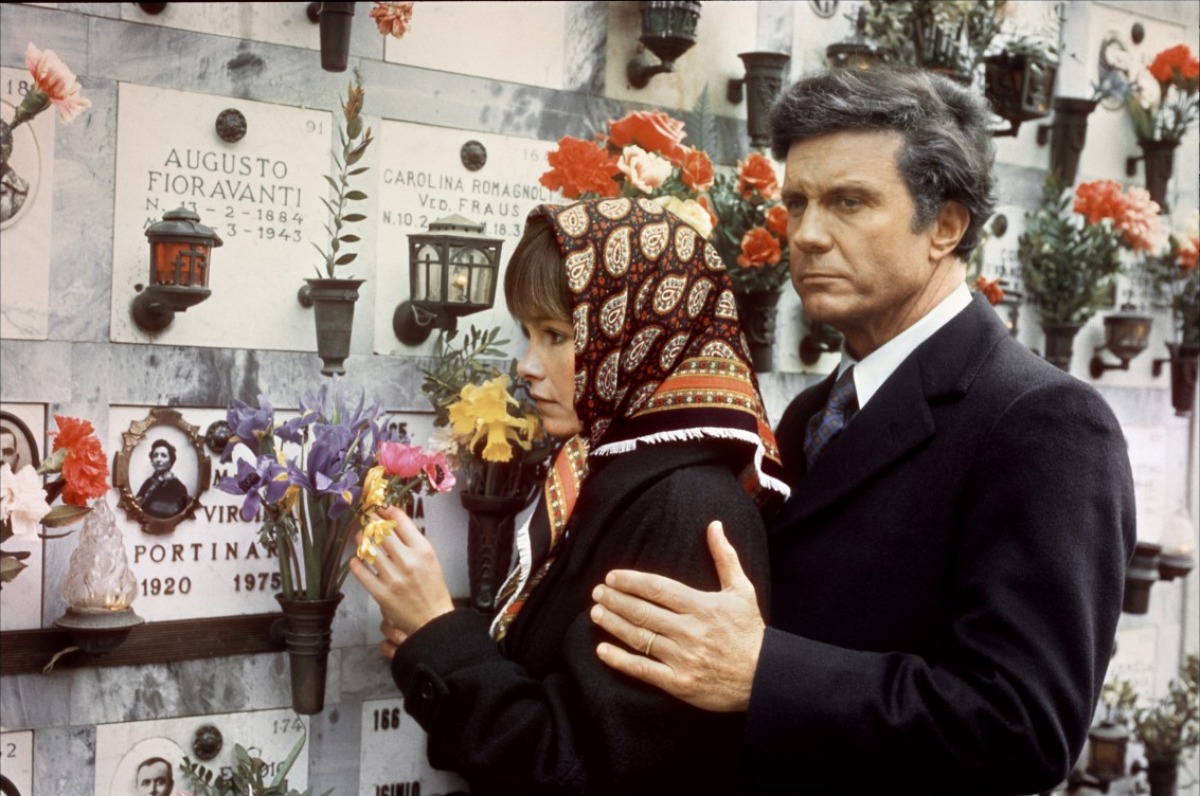
1976’s Obsession marked the first of Brian DePalma’s soft Hitchcock remakes that would define his 80’s output with Dressed to Kill (Psycho) and Body Heat (Rear Window) by retelling Vertigo as a Euro-gothic psychodrama far more perverse than anything Hitch had the stomach to write. So of course it comes from a script by Paul Schrader, a three-act tragedy penned as “Deja Vu” and adapted by De Palma in a truncated two-act version which eschewed Schrader’s original ending – much to his frustration – but still remains one of De Palma’s more singular, dark and troubling works for his contributions to it.
When his wife Elizabeth (Geneviève Bujold) and daughter Amy (Wanda Blackman) are kidnapped for ransom New Orleans businessman Michael Courtland (Cliff Robertson) sends only dummy money with the police so as not to risk his fortune in the negotiating of what seems mostly an inconvenience to him – only to find this leads to his wife and daughters’ deaths and that he let his greed take their lives and destroy his.
Years later we meet a very different Courtland going through the motions of the land development business with his partner Lasalle (John Lithgow) in Florence, Italy. Visiting the basilica San Miniato al Monte where he had met his wife years prior he finds the young painter’s assistant Sandra (also Geneviève Bujold) working on the restoration of a Renaissance Madonna, a spitting image of Elizabeth who quickly becomes the object of his obsession, as Michael stays behind in Florence while Lasalle returns home to pursue her in awe of her likeness, and some spiritual inclination that this likeness means a second chance and redemption.
But Courtland’s frantic desire to possess her and find Elizabeth within her – and Sandra’s compulsion to play along with this psychological game brings their relationship through configurations strange and perverse, which only get worse as the wealthy Courtland proposes a profitable marriage, and brings her, as the image of a dead woman, back to New Orleans to fill a dead woman’s shoes, and comes to an ending as disturbing anything Schrader ever wrote. And with an original score by Vertigo composer Bernard Hermann the film is haunted by the spirit of old Hollywood – a remake about the impossibility of reconstructing the past.
3. Blue Collar (1978) Co-Written and Directed by Paul Schrader
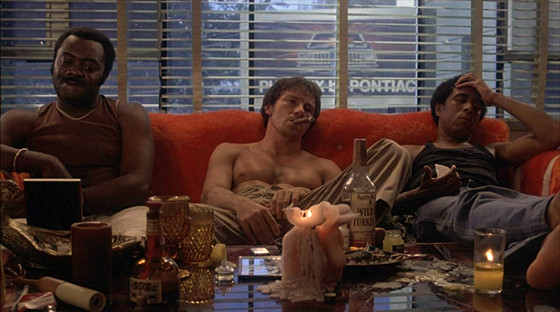
“They pit the lifers against the new boy and the young against the old. The black against the white. Everything they do is to keep us in our place.”
Schrader made the jump to directing in 1978 with Blue Collar, a working class drama set around a Detroit auto factory characteristic of the 1970’s socially conscious crime film but unique among Schrader’s output for its overtly political themes and naturalistic, neorealist stylings.
With a blues-rock theme from Jack Nitzsche the film sets its tone from its opening of chaotic and claustrophobic scenes on the factory floor. Introducing three friends and assembly line workers Zeke (Richard Pryor), Jerry (Harvey Keitel), and Smoke (Yaphet Kotto) each in their own financial holes – caught on tax fraud, working the night shift, and deep in debt to a loan shark, – Blue Collar meanders through the everyday of their working class lives – from conflicts at work and drab union meetings to nights out with the family and Saturday night parties – until finally, frustrated with their ineffectual union reps the men decide to rob their union headquarters in what Schrader calls a “wonderfully self-hating” sort of plan.
The robbery comes off but instead of cash they find only a logbook of illegal loans to mob connections across the country, and the plan becomes blackmail out of desperation. But paranoia runs high as the union reps and police catch on to the three and attempt to deal with them variously through buy-out, intimidation, and worse, breaking up their solidarity in order to protect themselves.
The film explores both union corruption at the hands of organized crime and the FBI’s fighting union rights on behalf of private interests, and the differences race makes in the men’s lives, and the way these differences are exploited by those in power.
4. American Gigolo (1980) Written and Directed by Paul Schrader
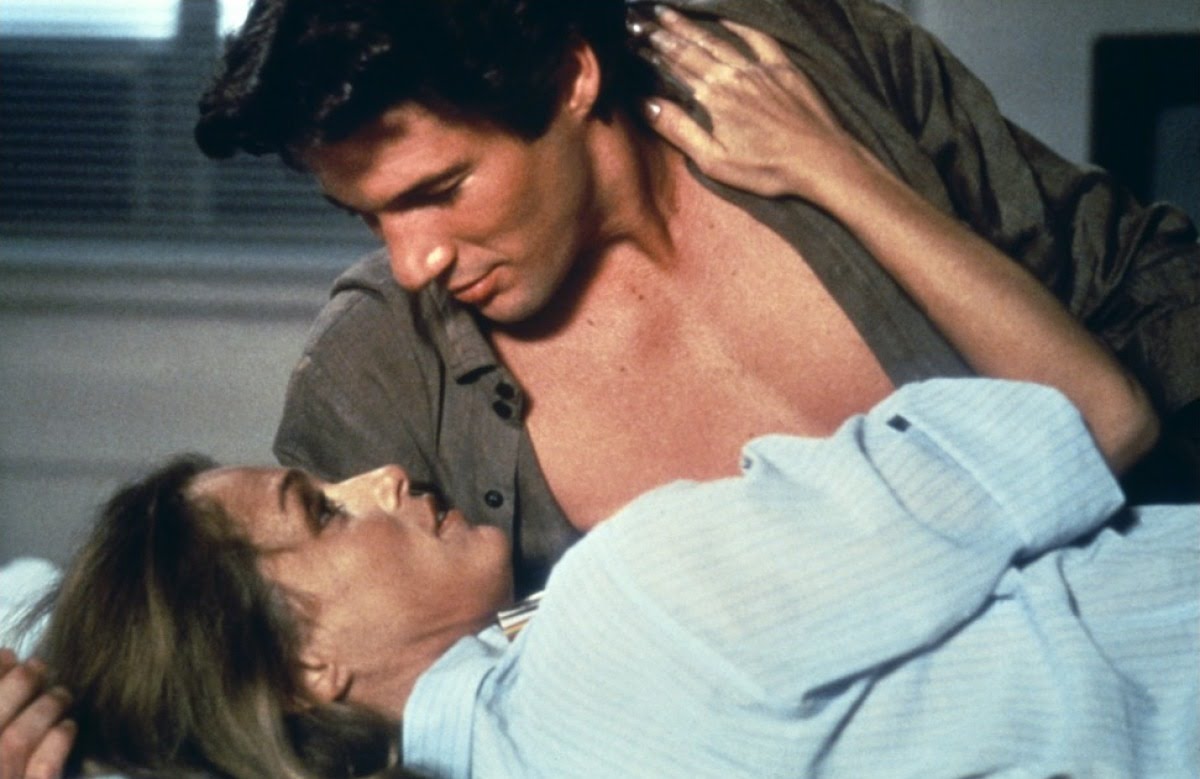
Opening on Richard Gere’s titular gigolo driving his Benz along the Los Angeles coastline to the shiny pop sounds of Blondie’s “Call Me” this is the introduction to a very different “man in a room”. Far from Travis Bickle’s tortured ascetic, Julian Kaye is a high class male escort who, under the management of Anne (Nina van Pallandt) works the society ladies of LA’s landed gentry and jet set and lives a life of luxury.
Things are good for Julian until following a last minute job filled as a favor to his friend Leon (Bill Duke), a procurer from Palm Springs he finds himself framed for murder when the woman later turns up dead and the society woman he was with on the night of her murder (K Callan) refuses to give an alibi for the protection of her personal image. Now Julian is pursued by a detective Sunday (Hector Elizondo) and quickly discovers how little any of his contacts mean when the chips are really down.
American Gigolo is a study of the superficial, a world of status and image, and a man who by conforming wholly to it loses all authentic connection to both the outside world and himself. In a paradox of selfishness the narcissistic Julian finds himself profoundly dependent on others for validation and definition – without them he does not exist. A closeted homosexuality may well lie at the center of many of Julian’s problems, but to a man incapable of introspection the notion remains inaccessible.
It is only through Michelle Stratton (Lauren Hutton), a client and the unhappy wife of an LA politician who believes she is in love with him that Julian finds the possibility for redemption. In the commitment to another Julian ironically rediscovers his independence.
5. Raging Bull (1980) Written by Paul Schrader
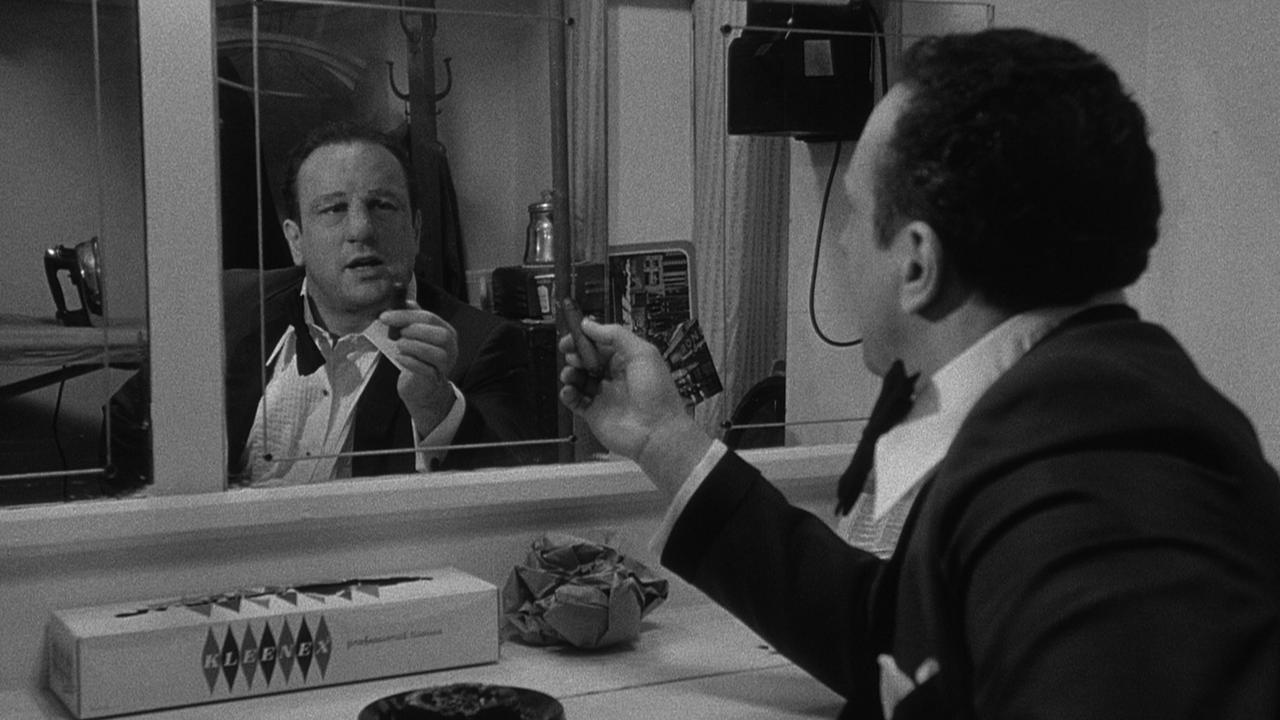
Raging Bull came at a difficult time for Scorcese, looking like bad luck after the box-office failure of his 1977 musical New York, New York and at the height of his drug addictions the project was spearheaded by Robert DeNiro and the script penned by Paul Schrader – also facing substance abuse problems at the time – from the memoir of middleweight boxer and 1950 world champion Jake LaMotta the film. Shot in a stark black & white inspired by the lurid imagery of tabloid photographer Weegee – came like a fist in the face to audiences for whom the boxing movie had been defined by 1976’s Oscar-winner Rocky.
The film’s fights are among Scorcese’s best directorial work, and, with cinematographer Michael Chapman make a gladiatorial arena of the ring – white light and black blood, shimmering in the heat and clamor of the crowds – and every blow a visceral audience battering, the heaviest in slow motion and underscored by the explosions of camera flashbulbs.
Tracking his career through the major fights with Joe Louis, Sugar Ray Robinson, Tony Janiro, and Marcel Cerdan the film intercuts his career ascension with the downward spiral of his personal life – which brings down his career in turn – at the hands of a self-destructive anger that alienates his manager and brother Joe LaMotta (Joe Pesci in his breakout role) and a paranoid jealousy that drives his wife Vickie (Cathy Moriarty) to leave him. After hitting a rock bottom that takes him out of the game we watch as LaMotta gains weight through excessive eating, has a short-lived run as a club owner, and, after a stint in jail, ending up a novelty act as a once-great boxer and stand-up comedian. A wash-up, but one who will always once have been the greatest.